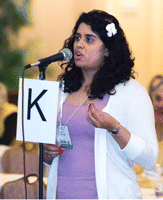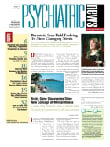The way in which psychiatrists practice many aspects of their specialty is changing, and more shifts—some seismic, some more subtle—are probably on the way. In response to some of these changes, members of the APA Assembly, at their meeting last month in Honolulu, grappled with a variety of issues that will impact the practice of current and future psychiatrists. New requirements for maintenance of certification were especially prominent on the agenda of the three-day meeting.
The delegates voted, for example, to urge the Board of Trustees to inform the directors of the American Board of Psychiatry and Neurology (ABPN) about a high level of member dissatisfaction with the maintenance of certification (MOC) process and changing requirements for it. The ABPN has issued MOC requirements at the behest of the American Board of Medical Specialties, and among the ones to which Assembly members and other psychiatrists object is the mandate that feedback about treatment must be obtained from several patients over a three-year period. These psychiatrists are concerned about the possibility that asking patients for formal feedback could compromise the psychiatrist-patient relationship.
Many psychiatrists are also opposed to changing requirements for continuing medical education as part of the certification process, maintaining that they "pose an undue and unnecessary burden on psychiatrists," Assembly delegates agreed.
The Assembly also called on APA leaders to invite the ABPN to participate in a joint commission "to explore the scope of [MOC] issues other than a cognitive evaluation." In addition, Assembly members voted to urge the Board of Trustees work group that is reviewing MOC issues to advocate with ABPN for a reduction in the cost of the MOC process. The chair of that work group, Area 5 Trustee Mary Helen Davis, M.D., reiterated that the changes are not under the control of APA or, in many cases, the ABPN, having been mandated by the American Board of Medical Specialties. She noted that among the work group's preliminary recommendations is to have APA develop guidelines to facilitate speaking with patients about the reasons for and process of obtaining patients' feedback on their treatment.
The work group is also recommending that APA explore ways that psychiatrists in specialized work settings, such as forensics and administration, can meet the patient-feedback requirements and that APA organize in-person and online forums to educate members and address questions they may have about the MOC process, Davis said.
The cost the ABPN has set for the initial certification exam also resulted in Assembly action, with delegates voting to have APA protest the current fee structure, since it is particularly burdensome to psychiatrists very early in their careers, when they can least afford it—the Assembly action paper labeled the cost "exorbitant" in light of the upcoming phase out of the oral exam.
Preparing for Electronic Health Records
Another force propelling change in the way psychiatrists have long practiced is the push by the federal government to have all physicians adopt health information technology, particularly electronic health records (EHRs).
To keep Assembly delegates as informed as possible and to provide them with information to take back to their district branches, Laura Fochtmann, M.D., and Robert Plovnick, M.D., presented a detailed update on EHRs, incentive programs to encourage their use, and the rapidly changing landscape of EHR product development.
Fochtmann is chair of the APA Committee on Electronic Health Records, and Plovnick is the director of APA's Department of Quality Improvement and Psychiatric Services.
DSM-5 Educational Materials Coming
Also on the horizon is the introduction of DSM-5, and the Assembly voted to have staff and other experts on the new manual's content develop educational materials that APA district branches can use to help educate their members about ways in which the new edition differs from previous ones. Should the Board approve this proposal, district branches will be urged to designate one or more trainers who themselves will be trained in multiple aspects of the new manual's content.
The Assembly also reached out to potential future psychiatrists by voting to invite two members of the group PsychSIGN to attend the two yearly Assembly meetings. PsychSIGN is an organization of medical students who are seriously considering entering psychiatry. Invitees will be provided with an official letter inviting them to the Assembly, and a copy will also be sent to their medical school deans.
Other Actions
Broad-ranging additional issues were also on the Assembly agenda. Among them, the delegates voted to
ratify bylaws changes previously approved by the Board of Trustees to add a minority/underrepresented (M/UR) group trustee to the Board and to reinstate a trustee-at-large position that was abolished about two years ago. The trustee-at-large will be elected in the 2012 election, and the first M/UR trustee will be elected in the 2013 election. After that, they will continue to be elected in alternate years for two-year terms.
call on the Board to adopt an APA position statement backing a prohibition on guns on campuses of colleges and other higher-education institutions. Proponents view such a statement as a major public-health initiative that would protect students' mental and physical health.
urge the APA Council on Research and Quality Care to consider developing a position statement opposing the use of automatic prescription refills, except in cases in which "the refill has been approved by the prescribing physician who has obtained verbal consent of the patient."
have APA advocate for the position that "the use of the multiaxial system for the purpose of billing or determining medical necessity is inconsistent with the concept of parity" in insurance coverage for mental health care.
have APA reaffirm its position that "there is no credible scientific evidence that same-sex attraction is pathological, chosen, needs a ‘cure,’ or entails a threat to heterosexual families or to children" and to condemn the criminalization of homosexual behavior in countries such as Uganda, where the death penalty is mandated for HIV-positive gay people who engage in same-sex relations.
The Assembly also heard an address from Rebecca Patchin, M.D., immediate past chair of the AMA's Board of Trustees. Patchin focused on one of the AMA's key initiatives, namely, its advocacy efforts to convince Congress to abolish the complex formula that is used to determine how much physicians are paid for Medicare services—the sustained growth rate formula, or SGR—and replace it with a payment system that is more in line with the cost of actually providing care to Medicare beneficiaries. The AMA is urging a five-year period of stabilized payment rates followed by a transition to a more equitable payment system, she said.
Patchin noted that the AMA is also supporting a recently introduced House bill—HR 1700, the Medicare Patient Empowerment Act—that would permit negotiations between Medicare patients and their physicians, thus allowing these patients to pay their physicians more than the fee schedule allows.
She also praised APA's delegates to the AMA for their effectiveness in bringing crucial mental-health-related issues to the House of Delegates and getting their proposals enacted.


